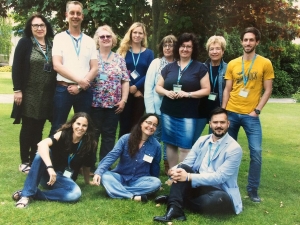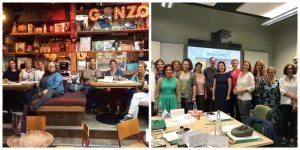Elemek megjelenítése címkék szerint: 21st century teacher
21st Century Thinking Skills - Canterbury
2017 júliusában egy 5 napos angol nyelvű továbbképzésen vettem részt, amelynek témája a 21. századi gondolkodási készségek voltak. A szervező cég, a Pilgrims, nagyon színvonalas nyelvtanárképzéseket tart, már rég óta ismertem munkásságukat. A képzés helyszíne a Kenti Egyetem volt, Canterburyben.
A hétfői program csapatépítéssel, majd a program és a hetiterv ismertetésével zajlott. Volt idő az adminisztrációs feladatok ellátására is.
Hétfőn reggel kezdődött a tanfolyam. Először regisztráltunk, majd pontosítottuk a heti időbeosztást, megismertük a kurzus résztvevőit. Mindenkiről fotó készült, ami a bejáratnál található közösségi helyiség képernyőjén egész héten látható volt a többi hasznos információ mellett. Kaptunk egy mappát rengeteg hasznos információval, tudnivalóval.
Tanárunk Hania Kryszewska volt. A csapat 10 főből állt, ebből négy magyar résztvevő is volt. Ez rendkívül pozitív élmény volt, mert addigi tapasztalataim ellenére, meglepően keveset beszéltünk egymás között magyar nyelven.
A képzés rendkívül gyakorlatias volt, rengeteg feladatot néztünk meg, sok módszert kipróbáltunk. A képzés az alábbi tartalmak mentén biztosította a feladatokat: 1. Írásbeli és szóbeli kommunikációs gyakorlatok, 2. Kritikai gondolkodás és probléma megoldás, 3. Kreativitás és innováció, 4. Csapatszellem és csoportmunka, 5. IKT és médiaműveltség, 6. Munkaetika és szakmaiság, 7. Vezetői készségek és projektmenedzsment, 8. Rugalmasság és alkalmazkodóképesség,
A képzés naponta három blokkban zajlott: délelőtt két alegységet, délután pedig egy nagyobb egységet tartalmazott.
A feladatok, gyakorlatok és tanítási módszerek fókuszában a kritikai gondolkodás állt, nagyon sok hasznos ismeretre rámutatott a képzőnk, és bár kiemelt előnye a kurzusnak, hogy gyakorlatias volt, sok hasznos elméleti ismeretre is rávilágított, sok anyagot kaptunk.
A legfontosabb 21. századi készségek a kurzus alapján: kommunikáció, együttműködés, kreativitás, megújulás / újítás, kritikai gondolkodás, problémamegoldás.
A legfontosabb tanulság számomra, a csapatkohézió, csapatdinamikák alakulásának fejlődésének megfigyelése volt. Izgalmas volt látni, hogy egy nemzetközi tanárcsapat nemzetközi vizeken mennyire hatékony tud lenni, és hogy mennyire kapcsolnak be azok a sztereotípiák, amelyeket mindenki magával hozott.
A program teljes volt, átgondolt és megszervezett, nagyon fontos volt számomra a szakmai fejlődésem elősegítésében.
A Szabó Lőrinc Kéttannyelvű Általános Iskola és Gimnázium disszeminációs oldala itt érhető el.
How I became a more skilled 21st century teacher
As a participant in an Erasmus Plus mobility during August 2017, I had some wonderful experiences worth sharing. First, the location: Norwich is a beautiful, walkable city with copious amounts of medieval architecture. While there one of the tutors told us that there are enough pubs that you could visit a different one each day of the year and enough churches that you could visit a different church each Sunday of the year. I learned that prior to the industrial revolution Norwich was the second largest city in England.
I stayed with a host rather than in university housing. Rita, my host, was both generous and willing to give me time and space to myself. Her house was a less than five minute walk from Delta House, where my course was held. She was also hosting two university students, one boy from Saudi Arabia, and another from Japan.
The course that I was enrolled in was Twenty-first Century Skills. It was a two week course co-taught by John and Liz McMahon. Because “twenty-first century skills” is such a broad topic, John and Liz endeavored to give us a good introduction to several skills and also provide us with resources to dig deeper into whichever skills most appealed to us. We were introduced to topics including digital literacy; CLIL (content and language integrated learning); CLT (communicative language teaching) and Dogme language teaching; Bloom's taxonomy of thinking skills and how to encourage more HOTS (higher order thinking skills) and not to rely on too many LOTS (lower order thinking skills); flipped classrooms with an emphasis on the usefulness of screencasting; collaboration and group work among students; different forms of assessment; differentiation; PBL (project-based learning); keeping a reflective journal; and on and on and on! Besides all of these topics, John and Liz, frequently provided us with the names of numerous pedagogical and linguistic theorists for us to explore in the future.
On the final day of the course we were instructed to give a twenty minute presentation on a twenty-first century skill we found interesting and which we'd like to learn more about. My presentation was the introduction of a project based on PBL as a means for encouraging my students to explore the concept of civic literacy in the twenty-first century. This final activity was perhaps the most frustrating part of the course for me. Right from the first presentation we were running behind schedule and by the time we finished in the afternoon of the final day, we didn't have time to give proper feedback to John and Liz regarding the course. Nor did we have time to summarize and conclude our learning and observations. In the future I would recommend that John and Liz spread the presentations out over two days to avoid the rush at the end.
Who were we, the participants? We were twelve teachers, some of us teaching primary school students, some secondary school students, some adult learners and others were even teacher trainers. Five of us came from Spain, three from Hungary, and one each from the Czech Republic, Russia, Estonia, and Brazil. The youngest of us was 29 and the oldest... had a birthday and turned nineteen again. I was the only male, the only native English speaker, the least experienced, and the second youngest. These factors left me feeling a bit out of place in the beginning despite the group work and social programs. However, after a few days I felt much more like a member of the group. By the end of the second week, we had really become a close and supportive group. Some participants stated that they felt they learned more from each other than from the course and its content. I wouldn't go that far, but I was very pleased with the group and am confident that I have built new friendships which will also support me in my teaching.



Tanártovábbképzés külföldön - pályázattal